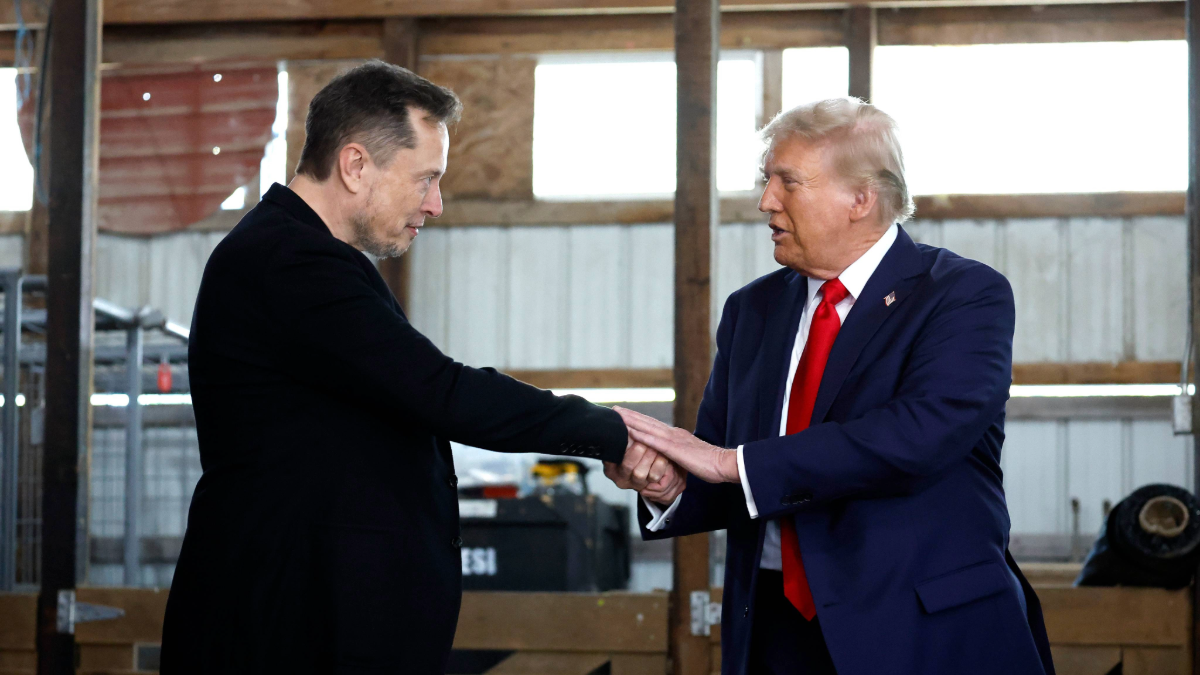The Techlash Will Not Disappear Under Trump 2.0
Matteo Nebbiai / Jan 15, 2025
BUTLER, PENNSYLVANIA - OCTOBER 5, 2024: Elon Musk (L) shakes hands with then-Republican presidential nominee now President-elect Donald Trump backstage during a campaign rally at the Butler Farm Show grounds. (Photo by Anna Moneymaker/Getty Images)
The relationship between President-elect Donald Trump and Big Tech has always been complex. Trump used social media to get elected but despised content moderation, making accusations of censorship and ultimately creating his own platform from scratch. On the other hand, he acknowledged that tech firms are significant assets that project American power and are to be protected. His relationship with Elon Musk (and before him, Peter Thiel) demonstrated that a coalition between the MAGA movement and Silicon Valley is indeed possible.
How will the second Trump presidency change digital regulation in the United States? As during the first Trump administration, this matter cannot be reduced to simplistic cleavages such as regulation vs. deregulation or moderation vs. free speech. I identify at least three aspects to investigate: the transition from “Big Tech vs. the State” to tech cronyism, the implications of “America First” as a governing philosophy, and the potential for selective (de)regulation.
1. From “Big Tech vs. the State” to Tech Cronyism?
In the past, many digital regulation proposals in the US placed the government and Big Tech on opposite sides. These include past proposals to reform Section 230, anti-piracy legislation, and data protection provisions. Accordingly, President-elect Trump has often treated tech CEOs as a united lobby.
The “Big Tech” coalition might be less united during the second Trump presidency. While this phenomenon started some time ago, Trump’s loyalty-based ruling style could accelerate the process: rather than opposing legislation, companies will likely race to cooperate with Trump and the Republican-led Congress. For instance, Elon Musk is rooting for stronger platform regulation, convinced that the burden of such norms would fall on Facebook rather than X. He is betting on classic crony capitalism and regulatory capture: politically loyal firms are awarded favorable rules (and enforcement), while enemies are punished. This possibility must be very clear to Amazon founder Jeff Bezos, Meta founder and CEO Mark Zuckerberg, Apple CEO Tim Cook, and Google CEO Sundar Pichai, who each congratulated Trump after his victory.
2. America First
While President-elect Trump’s relationship with Big Tech might be messy at the domestic level, the international posture of a Republican-led government will likely be more straightforward: we can expect an aggressive opposition to any attempt to regulate American technology by governments abroad. This could ultimately intimidate regulators and policymakers from other countries or jurisdictions, such as the EU, or make digital regulation enforcement a chip to be exchanged in trade war negotiations.
Two indicators that this is where things are headed include Sen. Ted Cruz’s (R-TX) letter raising suspicions about UK and European AI policy organizations and Vice President-elect JD Vance’s threat to withdraw US support for NATO if the EU enforces the Digital Services Act against X. Interestingly, Vance’s threat shows how digital policy has become so salient that even military interdependence can be weaponized to coerce allies on such matters.
3. Selective (de)regulation
Finally, depending on the technology and policy goal, we can expect a strategic use of regulation or deregulation.
- Regarding social media, on the one hand, President-elect Trump hinted at new content moderation requirements such as platform liability for terrorism and child pornography content and a mandatory redress mechanism for users (in a way not dissimilar to some EU regulations), while reform of Section 230 is still possible. On the other hand, Trump opposes any trust and safety intervention that feels “censorial,” such as academic research on misinformation or private initiatives influencing platform moderation practices.
- On artificial intelligence, we can expect a deregulatory approach, both for ideological reasons (Trump and his Silicon Valley supporters believe they are fighting against “woke AI”) and to compete with China. We can anticipate backtracking on President Biden’s executive order and hostility towards any coordination at the international level.
- Antitrust policy is complicated. During the first Trump administration, antitrust enforcement was far from moribund. During the 2024 campaign, Sen. Vance (with other conservatives) praised Federal Trade Commission chair Lina Khan’s work. Nevertheless, Khan will be replaced, and while Trump’s nominee appears bullish on enforcement against Big Tech, he also says he will pursue a “pro-business,” “pro-merger,” and “anti-censorship” agenda.
…Everything at once
Finally, some of these trends might conflict with each other. For instance, the fate of TikTok depends on whether President-elect Trump will lean more toward the “America First” argument (competition from foreign firms should be smashed) or “Tech Cronyism” philosophy (Meta’s disloyalty has to be punished, hence a valid competitor such as TikTok should not be weakened).
Ultimately, tech policy under Trump 2.0 will likely be loyalty-based, proactive domestically but protective internationally, and tailored to the interests of specific technologies, companies, and even individuals. Despite an overall grim outlook, supporters of tech regulation can hope that the new administration’s ambiguities will also offer some windows of opportunity to push for more – and not less – oversight of Big Tech.
Authors
